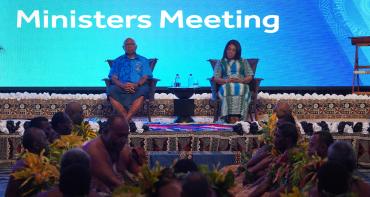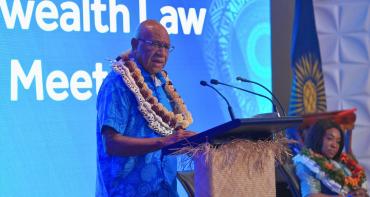Departure Statement by Commonwealth Secretary-General Kamalesh Sharma.
Today I concluded a successful visit to Sri Lanka, one of the founding members of the modern Commonwealth in 1949 and our association’s current Chair-in-Office.
I called on the President, His Excellency Mahinda Rajapaksa and the Minister of External Affairs, Hon Professor G L Peiris. I also called on the Speaker of Parliament, Hon Chamal Rajapaksa, together with other leading Members of Parliament and met the Deputy Leader of the Opposition, Hon Karu Jayasuriya.
I met the Chair of the Human Rights Commission of Sri Lanka, Justice Priyantha R P Perera, and other Commissioners as well as the Commissioner of Elections, Mr Mahinda Deshapriya.
I also met Commonwealth High Commissioners resident in Colombo, and the United Nations Resident Coordinator in Sri Lanka, Mr Subinay Nandy.
Implementation of CHOGM mandates
My visit marks the half-way point in the two-year tenure of the President of Sri Lanka as Commonwealth Chair-in-Office. I was pleased to be able to discuss a range of Commonwealth issues, including the implementation of mandates set by Commonwealth leaders at their Commonwealth Heads of Government Meeting (CHOGM) in Colombo in November 2013. I briefed President Rajapaksa on progress with these, many of which have benefited from his personal leadership and the guidance of the Sri Lankan Government.
Since the Colombo CHOGM, the Commonwealth has taken a strong global position through a collective statement by its Heads of Government on the Post-2015 Global Development Framework; the needs and priorities of small states, especially debt and climate change challenges, have been given high profile internationally together with practical progress towards creating a Trade Finance Facility and a Centre of Excellence for small states; a Climate Finance Skills Hub for climate-vulnerable states is being advanced; a major new on-line project for sharing technical assistance between Commonwealth states is being developed; and, an examination of barriers to movement of Commonwealth citizens across borders of our member states, is underway.
I also discussed the progress being achieved on reforms within the Commonwealth Heads of Government Meeting so that it has greater contemporary impact and effectiveness as a biennial gathering of our leaders.
I addressed the importance of the Commonwealth Ministerial Action Group considering the full breadth of its enhanced and constructive mandate when it next meets in March 2015.
Commonwealth Partnership with Sri Lanka
Through my Good Offices, we have been collaborating with Sri Lanka and providing technical assistance towards achieving its national goals and advancing Commonwealth values and principles to which the Government of Sri Lanka has attached importance.
Human Rights Commission of Sri Lanka
Our work with the Human Rights Commission of Sri Lanka has been lifted significantly, reflecting in particular the Commonwealth’s recognition that the protection and promotion of human rights are the foundations of peaceful, just and stable societies.
Our deepened engagement is aimed at enhancing the functional independence, authority and effectiveness of the Commission. It is our continued ambition, shared by the Government of Sri Lanka, to have the Commission’s ‘A’ status restored by the International Coordinating Committee of National Institutions for the Promotion and Protection of Human Rights. We are developing a comparative compendium of practice across the Commonwealth concerning the appointment procedures for Commissioners and which enhances the independence of national human rights institutions.
Our technical assistance to the Commission has included strengthening its capacity to work with international human rights mechanisms in Geneva. We also organised a special session for the Commission on the protection of human rights defenders post-conflict.
Another notable area of our work with the Commission is its contribution to national reconciliation efforts premised on the Lessons Learnt and Reconciliation Commission’s recommendations. I was pleased to receive the Commission’s Reconciliation Action Plan, which we have developed with the Commission as part of our partnership. This Action Plan is to be implemented with Commonwealth expertise and technical assistance from 2015. The Action Plan includes nine focus areas: addressing complaints related to disappearances; analysing current protection issues of vulnerable communities; welfare of detainees; promoting culture and heritage; restitution and compensation; memorialisation; promotion and protection of the rights of ethnic and religious minorities; human rights education and peace education; and, public information.
This Action Plan is an important outcome following senior level participation of the Government of Sri Lanka and the Human Rights Commission at the 2013 Commonwealth Roundtable on Reconciliation in London which saw participation from Commonwealth member states sharing their post-conflict experiences and best practices. Thereafter, we also convened a Roundtable on Reconciliation in Vavuniya, together with civil society and religious leaders as well as the Commission.
Parliament of Sri Lanka
We are appreciative of the willingness of the Parliament in partnership with the Government of Sri Lanka to host a meeting in May 2015 of Commonwealth Parliaments in the Asia region to build understanding and capacity of parliamentarians in their roles and responsibilities regarding the protection and promotion of fundamental human rights.
Judiciary
The Commonwealth has a clear commitment to an independent and effective judiciary, since this is integral to upholding the rule of law, securing public confidence and dispensing justice effectively.
A compendium of practice across the Commonwealth membership, and its expert analysis undertaken by eminent Commonwealth scholars regarding the appointment, tenure and removal of senior judicial individuals was shared with Sri Lanka in August 2013. This has been received by the Government as an input of great value and we now welcome the indication that it will be addressed by a Parliamentary Select Committee in early 2015.
We remain available to provide technical assistance with legislative drafting, as was earlier offered, towards achieving the Commonwealth’s priority of a sound basis for the separation of powers in all our member states.
Office of the Commissioner of Elections
The Commonwealth attaches high priority to the inalienable right of individuals to participate in democratic processes, including free and fair elections.
I therefore discussed with the Commissioner of Elections the recommendations of previous Commonwealth observation exercises, including those of the observers who were present for the Northern Provincial Council elections in September 2013. We discussed continuing challenges that need to be addressed by all concerned, including pre-electoral violence and the misuse of State resources for electioneering.
I was pleased to learn that a number of the recommendations of Commonwealth observers have been accepted and implemented, including improvements to the voting conditions of vulnerable groups. I was particularly pleased to receive confirmation from the Commissioner that, in future, accredited domestic observers will have full access to the vote counting process, which is a global election management best practice.
Commonwealth election observers in Sri Lanka have drawn attention to the fact that the Office of the Commissioner of Elections is not fully independent. The Commonwealth is preparing a compendium of practice from across the full membership concerning the appointment and independence of Electoral Commissions, and will share this with Sri Lanka.
In light of discussions with both the Commissioner and the Government of Sri Lanka, I look forward to deploying Commonwealth observers for the next nation-wide elections.
The Commonwealth will also provide further training opportunities in early 2015 for junior election management professionals from the Office of the Commissioner of Elections.
Youth
The Commonwealth collectively recognises the positive and active role and contribution of young people in promoting development, peace and democracy.
I wish to place on record the Commonwealth’s deep appreciation for the willingness of the Government of Sri Lanka to host the Secretariat of the newly-established Commonwealth Youth Council, which is the recognised representative voice of young people in the Commonwealth.
Very good progress has been made in establishing the Council, building its membership and agreeing a strategic direction as well as launching practical work, including its strong advocacy to have young people recognised in the Post-2015 Global Development Framework now being negotiated inter-governmentally in the United Nations.
The support staff and facilities provided at Hambantota are appreciated by the Commonwealth at large.
Media
At the 2013 CHOGM in Colombo, Commonwealth leaders underlined the importance of freedom of expression, including open dialogue and the free flow of information, and a free and responsible media. There is a vibrant media in Sri Lanka, which disseminates diverse viewpoints and ideas through a range of mediums. A responsible and professional media is a vital ingredient of all Commonwealth societies, and should be encouraged and sustained, and should be able to operate with freedom in a secure environment.
The Sri Lanka Press Council and the Sri Lanka Press Institute have identified areas with us, where the Commonwealth will provide practical technical assistance. During 2015, the Commonwealth will support the professional development of journalists in partnership with these apex industry bodies in Sri Lanka.
Civil Society
In the Charter of the Commonwealth, our people and governments worldwide recognise “the important role that civil society plays in our communities and countries as partners in promoting and supporting Commonwealth values and principles, including the freedom of association and peaceful assembly, and in achieving development goals.” We therefore place high priority on freedom and space for civil society and on its legitimate concerns being addressed. In Jaffna and Colombo, I met and benefited from conversations with civil society representatives who briefed me on a range of issues such as human rights, governance, reconciliation, election observation, the rule of law, and the challenges facing Sri Lanka.
Northern Province
My one-day visit to the Northern Province was a valuable opportunity to see at first-hand the significant progress being achieved in the post-war period. In this context, I was pleased to meet the Governor, Maj Gen (retd) G A Chandrasiri; the Chief Minister, Justice C V Vigneswaran; the Leader of the Tamil National Alliance, Hon R Sampanthan; the Provincial Minister of Education, Cultural Affairs, Sports and Youth Affairs, Hon Thambirasa Kurukularasa; and, the Provincial Minister of Health and Indigenous Medicine, Hon Dr Pathmanathan Sathiyalingam.
Regarding our partnership with the Human Rights Commission of Sri Lanka, I was pleased to see impressive and important projects being supported by the Commission in Northern Province. This included crucial work to support and offer access to justice for women and girls who have been victims of violence; and the partnership efforts towards the durable implementation of the trilingual language policy at Jaffna Police Station. I also visited a community in the village of Allarai where the Commission has worked with government partners to restore ownership of community land from the military to families displaced during the war and to rebuild their homes and community.
Significant effort has been made by the Government of Sri Lanka to redevelop infrastructure and basic services. It is my sincere hope that these public goods will increasingly add economic value, advance the welfare of the citizens of Northern Province, and nurture development and prosperity. These are important developments in peace-building and in creating the conditions for enduring harmony.
Equally important are steps that empower the people of the Province and those whom they elect as their leaders. These include addressing legitimate concerns about restricted and monitored movement of both the citizens of the Province in their daily lives and those visiting them for lawful purposes, and a continued reduction in the military security role in civilian life in the Province.
I encourage all political leaders to take advantage of the peace dividend that has been established, including enabling full use of the financial resources now available for further development and growth in the Province.
Reconciliation
I also encourage the Government of Sri Lanka to accelerate its efforts towards sustainable reconciliation and consolidation of its successful and hard won peace through continued implementation of the recommendations of Sri Lanka’s Lessons Learnt and Reconciliation Commission.
There cannot be durable reconciliation without knowledge of the whereabouts of missing persons and accounting for their disappearance or loss. Healing and forgiveness are possible only with full knowledge. I wish success to the presidential commission set up for this purpose in its work. I am pleased that four out of five international experts advising the Commission are from Commonwealth countries.
Counter-Terrorism
The Commonwealth recognises that international peace and security, sustainable economic growth and development and the rule of law are central to progress and prosperity for all. Terrorism is also recognised by the Commonwealth as a major global challenge.
I was therefore pleased during my visit to meet the Executive Director of the UN Counter-Terrorism Committee Executive Directorate (CTED), Mr Jean Paul Laborde. The Commonwealth is working in an active partnership with the CTED to prevent and combat terrorism, to build the capacity of member states, and to foster international and regional cooperation and coordination. This includes technical support for specialist counter-terrorism prosecutors and for developing model counter-terrorism legislative provisions. Our support for counter-terrorism initiatives within rule of law and human rights frameworks remains an area of importance which we continue to make available to all our member states. We agreed to strengthen the practical partnership between the Commonwealth Secretariat and the CTED.
The Commonwealth Secretariat looks forward to its continuing partnership with the Government and people of Sri Lanka.
Colombo, 29 October 2014



